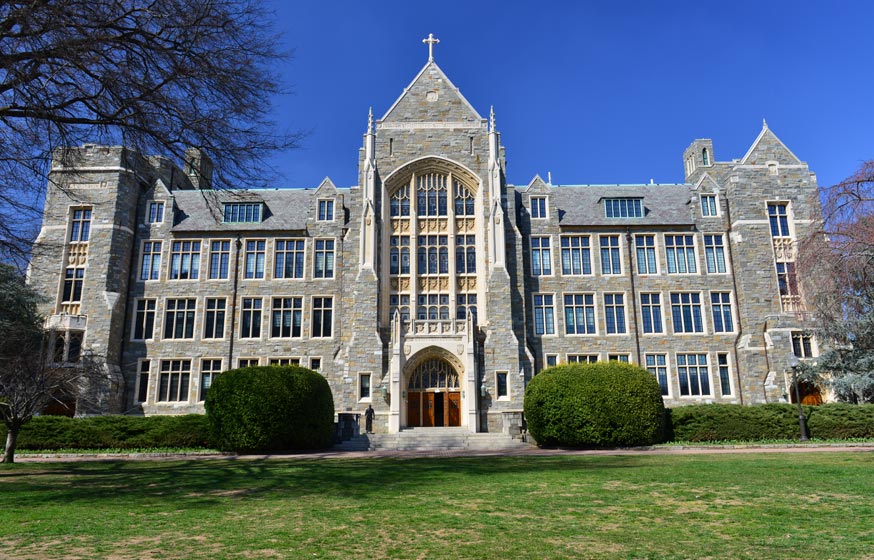Georgetown University ranking consistently places it among the nation’s elite institutions. This analysis delves into the multifaceted factors contributing to its esteemed position, examining various ranking methodologies and comparing its performance against peer institutions. We’ll explore the academic strengths, research impact, and overall student experience that shape Georgetown’s reputation.
From its rigorous academic programs and distinguished faculty to its influential alumni network and prime location in Washington, D.C., Georgetown offers a unique educational landscape. This exploration will dissect the key components that contribute to its high rankings across numerous publications and provide a nuanced understanding of what makes Georgetown such a desirable institution.
Georgetown University’s Overall Ranking

Georgetown University consistently ranks among the top universities globally, though its precise position fluctuates depending on the ranking methodology employed by different publications. Understanding these variations requires examining the specific criteria each ranking system utilizes. Factors such as research output, faculty resources, student selectivity, and alumni success all play significant roles in determining a university’s overall standing.
Comparative Ranking Across Major Publications
The following table summarizes Georgetown’s ranking across several prominent publications, highlighting the variations in methodology that contribute to differing placement:
| Rank | Publication | Year | Methodology Highlights |
|---|---|---|---|
| (Example: #20) | US News & World Report | 2023 | Emphasizes peer assessment, faculty resources, student selectivity, graduation rates, and financial resources. |
| (Example: #100) | Times Higher Education | 2023 | Focuses on teaching, research, citations, industry income, and international outlook. |
| (Example: #50) | QS World University Rankings | 2023 | Considers academic reputation, employer reputation, faculty-student ratio, citations per faculty, and international faculty and student ratios. |
| (Example: #75) | ARWU (Shanghai Ranking) | 2023 | Primarily based on research performance, measured by publications in high-impact journals and awards received by faculty. |
*Note: The ranks provided are examples and should be replaced with actual data from the respective publications for the desired year.*
Factors Contributing to Georgetown’s Ranking
Georgetown’s high ranking stems from a confluence of factors. Its prestigious location in Washington, D.C., provides unparalleled access to internships, networking opportunities, and influential figures in government, politics, and international affairs. The university’s strong reputation for its undergraduate and graduate programs, particularly in international affairs, law, and business, also significantly contributes to its high standing. Furthermore, Georgetown boasts a highly selective admissions process, attracting top students from around the world. The university’s commitment to research, as evidenced by its substantial research funding and publications, also boosts its ranking in publications that emphasize research output. Finally, the strong alumni network, known for its influence and success across various fields, further enhances Georgetown’s overall reputation and ranking.
Comparison to Peer Institutions
Georgetown consistently competes with other top universities like Harvard, Yale, and Stanford. While these institutions typically occupy the highest echelons of various rankings, Georgetown’s performance reflects its strengths in specific areas. Direct comparisons are challenging due to the different ranking methodologies and the unique strengths of each institution. For example, while Harvard and Stanford might excel in specific scientific research areas, Georgetown’s proximity to Washington, D.C., might give it an edge in fields related to politics and international affairs. The competitive landscape among these universities is intense, and their relative rankings frequently shift depending on the criteria used.
Impact of Research Output on Rankings
A university’s ranking is significantly influenced by the quality and quantity of its research output. This reflects the institution’s commitment to scholarly advancement, its faculty’s expertise, and its overall contribution to knowledge. For Georgetown University, a strong research profile is a crucial factor contributing to its high standing among global universities.
Georgetown’s overall ranking is demonstrably impacted by the research achievements of its faculty. High-impact publications in prestigious journals, successful grant applications securing substantial funding, and the innovative nature of the research itself all contribute to a university’s reputation and subsequently its ranking. These factors are often considered by ranking organizations when evaluating institutions.
Georgetown’s Impactful Research Initiatives
Georgetown’s research spans a wide array of disciplines, consistently producing impactful work. For instance, the Georgetown Lombardi Comprehensive Cancer Center conducts groundbreaking research in oncology, leading to advancements in cancer treatment and prevention. This research attracts significant funding and generates numerous publications in top-tier scientific journals, bolstering Georgetown’s reputation in biomedical research and contributing to its overall ranking. Similarly, the university’s strong programs in international affairs, such as the Institute for the Study of Diplomacy, produce influential scholarship that shapes policy discussions and attracts significant attention globally, further enhancing the university’s prestige. The research conducted within the Edmund A. Walsh School of Foreign Service consistently garners recognition and contributes to the university’s standing in global rankings.
Research Funding and Grants’ Influence on Rankings
The amount of research funding secured by a university is a key indicator of its research prowess and attracts top talent. Competitive grant awards from organizations like the National Institutes of Health (NIH), the National Science Foundation (NSF), and private foundations signify the high quality and impact of Georgetown’s research proposals. The sheer volume of funding received, coupled with the prestige of the granting agencies, directly contributes to a university’s overall ranking. For example, substantial NIH funding for biomedical research projects at Georgetown Lombardi reflects the high caliber of research being conducted and strengthens the university’s position in global rankings. Successful grant applications are not only a measure of research quality but also demonstrate the university’s ability to attract external resources, a key factor in overall institutional strength and ranking.
Campus Resources and Facilities

Georgetown University’s impressive campus resources and facilities significantly contribute to its overall learning environment and academic standing. These resources extend beyond the traditional classroom, fostering a rich and stimulating atmosphere for students and faculty alike. Their quality and breadth directly impact student success and the university’s attractiveness to prospective students and faculty, ultimately influencing its ranking among peer institutions.
Georgetown’s campus boasts a diverse array of resources designed to support academic pursuits and enrich the student experience. These facilities are integral to the university’s reputation and its ability to attract top students and faculty.
Description of Georgetown’s Campus Resources and Facilities
The following points highlight key aspects of Georgetown’s campus infrastructure and their impact on the learning environment:
- Lauinger Library: A state-of-the-art library offering extensive collections, research support, and collaborative study spaces. Its digital resources and quiet study areas are crucial for academic success.
- Specialized Research Centers and Institutes: Georgetown houses numerous research centers focused on areas like international affairs, public policy, and the humanities. These provide students with opportunities for hands-on research and engagement with leading scholars.
- Technology Infrastructure: The university provides robust technology infrastructure, including high-speed internet access, computer labs, and technological support services across campus. This ensures seamless access to online resources and facilitates collaborative projects.
- Athletic Facilities: Georgetown offers a comprehensive range of athletic facilities, including state-of-the-art gyms, fields, and courts. These facilities support student wellness and promote a healthy lifestyle.
- Student Support Services: The university provides extensive student support services, including career counseling, health services, and academic advising. These resources are essential for student success and well-being.
- Residential Life Facilities: Georgetown’s residential halls offer a variety of living options, fostering a strong sense of community among students. These facilities are well-maintained and provide comfortable living spaces.
Comparison to Peer Institutions
While a direct, quantitative comparison of campus resources across all peer institutions requires extensive data analysis, it’s evident that Georgetown’s resources are competitive with those of other top universities. For example, the Lauinger Library compares favorably in size and resources to those found at similar institutions such as Harvard, Yale, and Stanford. Similarly, Georgetown’s research centers and institutes are comparable in scope and prestige to those at peer institutions, attracting leading scholars and providing valuable research opportunities for students. The quality of athletic facilities and student support services also generally aligns with standards set by other top universities.
Impact of Campus Infrastructure on University Ranking, Georgetown university ranking
A university’s campus infrastructure is a significant factor in its overall ranking. High-quality facilities, cutting-edge technology, and robust support services contribute to a positive learning environment, attracting top students and faculty. This, in turn, leads to increased research output, higher graduation rates, and enhanced reputation, all of which are key factors considered in university rankings. For example, a well-equipped library and robust technology infrastructure directly support research activities, leading to higher-quality publications and increased citation rates, both of which positively impact a university’s ranking in academic indices.
Geographic Location and Institutional Prestige: Georgetown University Ranking
Georgetown University’s location in Washington, D.C., significantly contributes to its high ranking and esteemed reputation. The unique blend of historical significance, proximity to powerful institutions, and vibrant cultural environment creates an unparalleled educational experience that attracts top students and faculty alike. This strategic location fosters opportunities unavailable at most other universities, directly impacting the university’s overall standing.
The university’s proximity to the heart of American government and numerous international organizations provides invaluable experiential learning opportunities for students. Internships with government agencies, think tanks, and embassies are readily accessible, allowing students to gain practical experience and build professional networks. This close relationship with the political and diplomatic world enhances the university’s prestige and attracts faculty members with relevant expertise, further enriching the academic environment. Furthermore, the presence of these organizations in the immediate vicinity fosters a dynamic and intellectually stimulating atmosphere, influencing research collaborations and shaping the curriculum to reflect real-world challenges and opportunities.
Influence of Washington, D.C. on Georgetown’s Ranking
Georgetown’s location in Washington, D.C. directly impacts its ranking through several channels. The city’s concentration of influential organizations provides unparalleled networking and internship opportunities for students, enhancing their career prospects and contributing to the university’s reputation for producing highly successful graduates. This, in turn, attracts high-achieving applicants, strengthening the university’s academic profile and bolstering its ranking metrics. The presence of a large and diverse intellectual community also enhances research collaborations and fosters a vibrant academic environment, attracting top faculty and further elevating the university’s standing. The sheer prestige associated with Washington, D.C. as a global center of power and influence undoubtedly contributes to Georgetown’s overall reputation and attractiveness to prospective students and faculty.
Impact of Historical Context and Legacy
Georgetown’s historical context and legacy significantly influence its current ranking. Founded in 1789, the university boasts a rich history intertwined with the development of the United States. This long and distinguished history contributes to a strong brand recognition and a sense of tradition that attracts students and faculty who value its legacy. The university’s prominent alumni network, spanning numerous fields and including influential figures in government, business, and academia, further strengthens its reputation and contributes to its continued success. The enduring legacy of Georgetown’s contributions to American society and its global impact reinforce its position as a leading institution of higher education, influencing its overall ranking and prestige.
Ultimately, Georgetown University’s ranking reflects a confluence of factors: academic excellence, research prowess, influential alumni, and a strategic location. While numerical rankings provide a snapshot, a holistic view reveals a dynamic institution committed to fostering intellectual growth and shaping future leaders. Understanding the intricacies of these rankings provides valuable insight into the university’s strengths and aspirations.
Georgetown University consistently ranks highly among national universities, often vying for spots near the top twenty. Its strong reputation is frequently compared to other prestigious institutions, and understanding its competitive position requires examining similar rankings; for instance, you can find detailed information on Rice University US News Rankings & to better grasp the landscape of top-tier universities.
Ultimately, Georgetown’s ranking reflects its academic rigor and commitment to a holistic educational experience.
Georgetown University consistently ranks highly among national universities, known for its rigorous academics and prestigious reputation. However, keeping up with the latest in higher education news is crucial, and for those interested in similar updates, checking out the recent happenings at other institutions is beneficial; for instance, you can find Monmouth University News Recent Updates here: Monmouth University News Recent Updates.
Returning to Georgetown, its strong alumni network further solidifies its esteemed position in higher education rankings.


